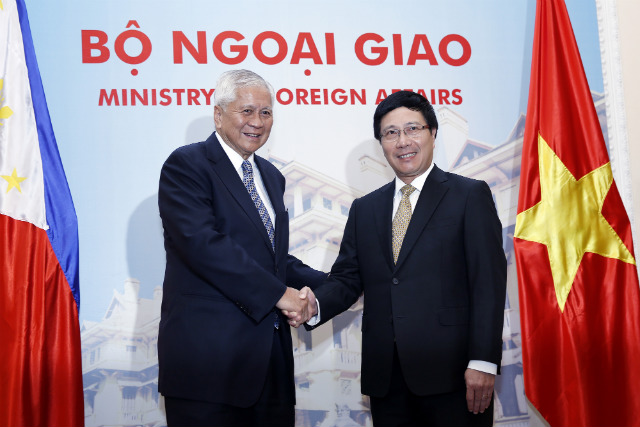The Philippine and Vietnamese armies also vow to conduct joint training as both countries face China's threats in the disputed South China Sea

STRATEGIC PARTNERSHIP SEEN. Philippine Foreign Secretary Albert del Rosario (left) shakes hands with Vietnamese Foreign Minister Pham Binh Minh (right) at the Government Guest House in Hanoi, Vietnam July 2, 2014. Photo by Luong Thai Linh/EPA
The Philippines and Vietnam announced on Thursday, July 3, that they will form a commission to forge a stronger, wide-ranging alliance as the two countries face security threats from an aggressive China.
The two countries agreed to form a commission to outline a strategic partnership, the Philippines said, after Philippine Foreign Secretary Albert del Rosario met with his Vietnamese counterpart on Wednesday, July 2.
The Philippines' Department of Foreign Affairs (DFA) said Del Rosario and Pham Binh Minh, Vietnam's deputy prime minister and foreign minister, “discussed a wide range of issues and agreed to further promote cooperation in many areas such as fisheries, ocean and maritime, defense and security, trade, and investment.”
“The foreign ministers also agreed to advance partnership to a higher level, including the establishment of a joint commission headed by the two ministers to formulate a road map in working toward a strategic partnership,” the DFA said.
The Philippines only has two strategic partners so far – the United States and Japan, both of which also remain challenged by China.
Vietnam, on the other hand, has forged at least 10 strategic partnerships over the past decade, according to the state-run Vietnamnet Bridge. These include partnerships with China, India, and Japan.
'Ready to align' vs threats
What exactly do these partnerships entail?
Experts say strategic partnerships remain vaguely defined, but agree these involve shared objectives to promote regional security, among other things.
Julio Amador III, an Asia Studies visiting fellow at the East-West Center in Washington, described strategic partnerships as “comprehensive: economic, political, and socio-cultural.”
“With the elevation of bilateral relations to a strategic level, Manila expects closer cooperation especially in military and maritime matters,” Amador wrote in a Thought Leaders piece for Rappler.
Amador said: “Strategic partnerships are also evidence that some countries are ready to align against a perceived threat to the regional order. This cooperative activity, premised as it is on shared values, makes it easier for other regional states and external stakeholders to come on board to prevent any one power from upsetting established norms.”
The analyst said moves toward strategic partnerships “indicate the willingness of the Philippines to expand its current bilateral and multilateral relations and deepen its ties with like-minded states.”
In the case of the Philippines and Vietnam, the proposed strategic partnership – brought up when Vietnamese Prime Minister Nguyen Tan Dung visited the Philippines in May – comes as both countries remain embroiled in disputes over the South China Sea.
Joint army training, too
During their meeting, the DFA said, Del Rosario and Minh “exchanged views on the rising tension in the South China Sea, and discussed the urgent need to address the escalating challenges through peaceful means and in accordance with international law including the United Nations Convention on the Law of the Sea.”
“The two foreign ministers urged that the Declaration on the Conduct of Parties in the South China Sea be implemented in its entirety, including refraining from the use of coercive force. The two ministers also agreed that the Code of Conduct in the South China Sea be expeditiously concluded without undue delay,” the DFA added.
In a separate meeting, the Philippine and Vietnamese armies also vowed to conduct joint training.
On June 24, Vietnam's official online newspaper reported a meeting between Armed Forces of the Philippines Chief of Staff General Emmanuel Bautista and his Vietnamese counterpart, Vietnam People's Army Chief of Staff Senior Lieutenant General Do Ba Ty.
The Philippine and Vietnamese armies agreed on the following:
- to “promote the exchange of delegations at all levels and cooperation in personnel training, and boost joint training on search and rescue activities at sea”
- to “work more closely to solve the problem of fishermen violating the law while fishing in bordering waters”
- to “exchange views on issues of mutual concern”
Duong said: “We've got to be united, and stand united. We will win.”
http://www.rappler.com/nation/62321-philippines-vietnam-commission-strategic-partnership?utm_source=feedburner&utm_medium=feed&utm_campaign=Feed%3A+rappler+(Rappler)

No comments:
Post a Comment
Note: Only a member of this blog may post a comment.